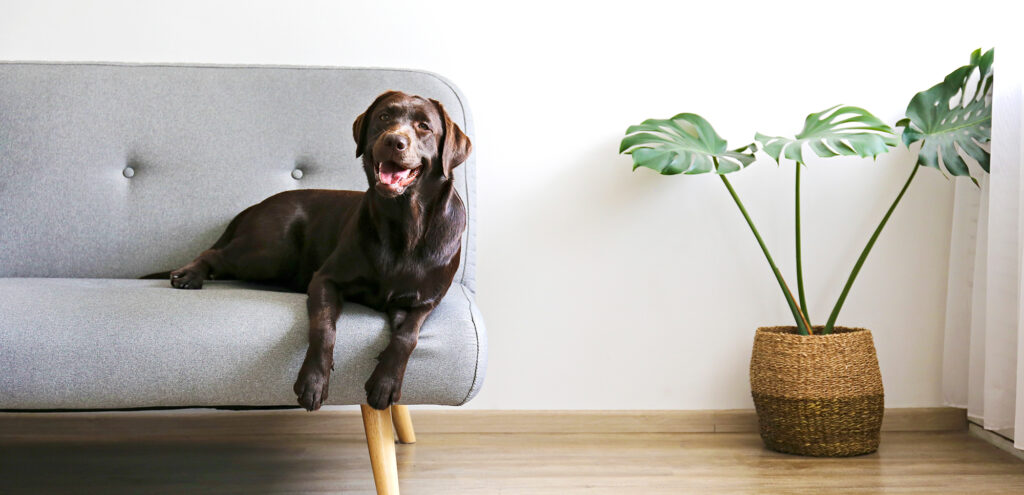The Best Dog-Safe Plants (Inside & Out)
Spring is finally here! The flowers are blooming, the rain is falling, and pet owners are anxiously planning what house plants and garden plants they want to grow this year. There may be one concern though. Are there any dog friendly plants available? You want to be sure to grow plants that are not toxic to dogs. There are quite a few options so don’t feel like you are limited. We’ve gathered a list for you to make it easy. Check it out below!

Safe Indoor House Plants
Our indoor pets mean so much to us so we want to make sure our house plants won’t affect them. Understanding what non-toxic options you have available can keep your dog safe so they can enjoy the indoor environment just as much as you. We’ve gathered our top 5 favorites below!
- True Palm – A true palm is safe for pets, including parlor palms and ponytail palms. Other types, such as the sago palm, is not considered a true palm and can be toxic to dogs. Check to make sure you are picking up the right version!
- Herbs – Interested in pet safe plants AND great seasonings for cooking? Herbs are a great choice! Basil, sage, thyme, and rosemary are wonderful, safe herbs.
- African Violets – This plant not only provides greenery to your house, but is also a flowering plant. It blooms pink-purple flowers during certain periods.
- Spider Plant – A spider plant is a great pet safe choice and can be easily hung from a hook, keeping them out of reach for your dog. As a bonus, they are low maintenance!
- Haworthia Succulents – This type of succulent is easy to care for and requires low watering. Steer clear of aloe vera succulents though as they resemble the haworthia succulent, but are toxic to dogs.
Safe Outdoor Garden Plants
Whether you’re growing a flower garden or a vegetable garden, be sure to plant items that are safe for dogs. We’ve gathered our top 5 favorite pet safe plants for flower gardens and a quick list of vegetable plants!
Dog Safe Flower Gardens
- Camellia – Coming in a variety of different colors, these beautiful flowering shrubs are easy to survive after being established in strong roots. They come back every year with little to no effort.
- Marigolds – These bright red-orange and yellow flowers attract bees to your garden for great pollination. They also act as a natural form of pest control so harmful bugs won’t ruin your garden.
- Sunflower – As one of the most recognizable flowers, sunflowers are dog-safe plants that grow several feet tall. They thrive in the sun and attract birds when the matured seeds fall out.
- Magnolia Bushes – To mix it up with your flowers, add in this pet friendly bush that offers a range of colored flowers including purple, white, or pink.
- Snapdragons – Tall and bright, these annuals are another safe flower for dogs. Plant these from the seed so you do not have to use fertilizers to help it grow.
Dog Safe Vegetable Plants
These vegetable garden plants are safe for dogs to be around – and to eat!
- Carrots
- Celery
- Zucchini
- Peas
- Beans
- Ripe Tomatoes
- Potatoes (must be cooked if you’re wanting to share with your pup!)
Indoor Plants To Avoid
We’ve mentioned a few indoor toxic plants above, but unfortunately there are more that you should be aware of. Here are a few other indoor plants to avoid if you have pets:
- Devil’s Ivy
- Snake Plants
- Swiss Cheese Plants
- Fiddle Leaf Figs
Outdoor Plants To Avoid
There are 10 common outdoor, poisonous plants to avoid. Some may only upset your dog’s stomach, but others may be more serious and cause intense vomiting or organ damage. Here is a list of those commons outdoor plants to avoid:
- Tulips
- Azaleas
- Daffodils
- Hydrangea
- Peony
- Apples – the fruit is okay for dogs to eat, but the stems, leaves and seeds contain cyanide
- Garlic
- Cherry – stems, leaves and pit are dangerous
- Peach – stems, leaves and pit are dangerous
- Lime – skin and other plant parts are dangerous, the fruit is safe
For a full list visit the Complete Guide to Poisonous Plants for Dogs.
Unlike indoor plants, some outdoor gardening may also require you to use chemicals such as fertilizer, pesticides and herbicides. If this is the case, keep your dog away by either placing a fence around the area or restraining them from being around it. Contact the ASPCA Animal Point Control Center at (888) 426-4435 if your dog ever gets into something dangerous.
While there may be a lot of toxic plants for dogs, there are plenty of safe options to keep your house or yard blooming. With spring on our mind, be sure to keep your dog healthy and safe during this time of planting!

